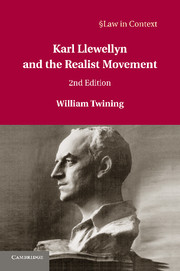Book contents
- Frontmatter
- Contents
- Foreword
- Preface
- Postscript
- Acknowledgements
- Abbreviations
- Part I The Rise of the Realist Movement 1870–1931
- Part II The Life and Work of Karl Llewellyn: A Case Study
- Part III Conclusion
- Appendices
- Appendices A The War Adventure
- Appendices B A Restatement of Llewellyn's Theory of Rules
- Appendices C Extracts from Law in Our Society
- Appendices D Llewellyn's Later Interpretations of Realism
- Appendices E Two Documents on the Uniform Commercial Code
- Appendices F The Pueblo Codes
- Bibliography
- General Index
Appendices F - The Pueblo Codes
from Appendices
Published online by Cambridge University Press: 05 December 2012
- Frontmatter
- Contents
- Foreword
- Preface
- Postscript
- Acknowledgements
- Abbreviations
- Part I The Rise of the Realist Movement 1870–1931
- Part II The Life and Work of Karl Llewellyn: A Case Study
- Part III Conclusion
- Appendices
- Appendices A The War Adventure
- Appendices B A Restatement of Llewellyn's Theory of Rules
- Appendices C Extracts from Law in Our Society
- Appendices D Llewellyn's Later Interpretations of Realism
- Appendices E Two Documents on the Uniform Commercial Code
- Appendices F The Pueblo Codes
- Bibliography
- General Index
Summary
The documents that follow may be of particular interest to those who are concerned with the recording, restatement or reform of tribal law especially where it survives within a ‘modern’ legal system. Llewellyn was invited to draft codes for three Pueblos : Zia, Santo Domingo and Santana. As far as I have been able to ascertain only one Pueblo, Santana, in fact formally adopted Llewellyn's draft code and it is doubtful if it was ever fully operative. The first document, which is addressed to ‘White lawyers’, throws some light on Llewellyn's conception of what he was doing. The second document, which is in the nature of a preamble or explanatory memorandum is a good example of Llewellyn's style in addressing the Pueblos. The excerpts from the draft code for the Santanas are taken from the General part and from the ‘Bill of Rights’. The code contained less than one hundred sections, divided into eight parts.
INTRODUCTORY NOTE ON PUEBLO CODES, FOR WHITE LAWYERS
A Pueblo Code is written against a background of effective, working ‘Common Law’ of the Pueblo. A written provision is not like a statute which stands on its language alone (as does the act of a legislature which is intended to change the common law rule); it is more like the principle laid down in a well-reasoned leading decision, to be applied or extended in terms of its underlying reason, and the people who feel and know that reason are the men of the Pueblo Council.
- Type
- Chapter
- Information
- Karl Llewellyn and the Realist Movement , pp. 602 - 610Publisher: Cambridge University PressPrint publication year: 2012



